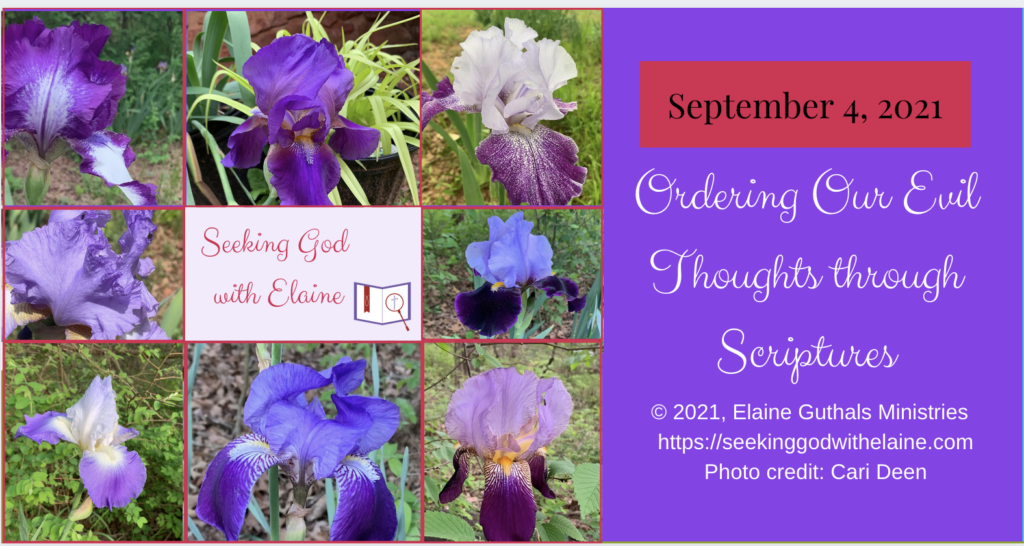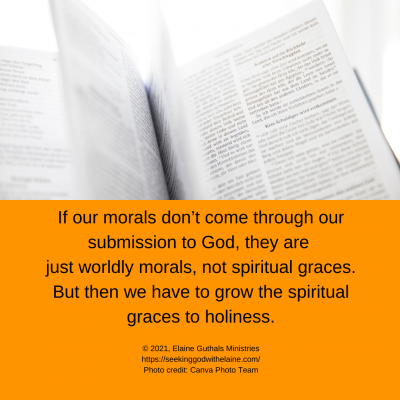As much as we try to prevent evil thoughts, they do show up in our minds. This daily devotional begins to look at how we can direct our thoughts.
Nuggets
- Scriptures are a book that we read that can change us.
- Jesus is the focus of Scriptures.
- The Word of God is — and will be — used to judge us.
To read devotions in the Redo for Godliness series, click the appropriate button below.
Devotions in the How Do We Live Godly Lives? series

Our last grouping that we talked about from Charnock’s sermon dealt with preventing bad thoughts. This section looks at ordering our evil thoughts.
“Awe your hearts with the thoughts of God’s omniscience, especially the discovery of it at the last judgment” (Charnock, The Sinfulness and Cure of Thoughts)
Charnock began by talking about using Scriptures to help us. Spurgeon wrote that Scriptures are alive and active.
Resource
Wait! What? How can a book be alive and active? How do we awe our hearts with it?
Let's Put It into Context #1
We’ve been looking at Charnock’s sermon entitled The Sinfulness and Cure of Thoughts to show us how to cleanse, a.k.a. sanctify, our thought processes. Charnock has taught us
- that we cleanse our thoughts when we return to having a strong relationship with God. We can do that by studying the Scriptures, meditating on God, contemplating on His creation, and praising Him.
- that we focus our thoughts by being humble instead of prideful, following God instead of the worldview, working instead of being idle, and laboring for Him.
Resource
Glossary
Here is a running list of what we’ve discussed previously.
Let's Put It into Context #2
When we are in awe of something, we respect it. We reverently approach it with fear and wonder. We can approach Scriptures this way.
Scriptures as a Book
“For the word of God is living and effective and sharper than any double-edged sword, penetrating as far as the separation of soul and spirit, joints and marrow. It is able to judge the thoughts and intentions of the heart” (Heb. 4: 12 CSB)
Scriptures are a book that we read that can change us.
One way we look at it is the Word of God is the Scriptures. When we are not following what it says, it does feel like a two-edged sword is cutting us.
Well, it is. It is convicting us of sin and trying to cut it out of us. Sins are actions by humans that disobey God and break one of His reasonable, holy, and righteous laws and commandments, goes against a purpose He has for us, or follows Satan’s promptings.
Thompson clarified that the edges have different purposes. One side is to correct and convert. The other side is to condemn and destroy.
Resource
I can see that. Scriptures call us and lead us to salvation. Those that don’t ABCD will be judged by these Scriptures in the end.
- Salvation is the gift of life through the deliverance from condemnation and sin to acceptance and holiness and changes us from being spiritually dead to spiritually alive.
- Holiness is the transcendent excellence of His nature that includes elements of purity, dedication, and commitment that lead to being set apart. Purity means possessing God’s moral character, having eliminated the stain of sin.
- Spiritual death is the spiritual separation from God that occurred as a consequence of Adam and Eve’s original sin. The spiritually alive are those who have ABCDed, so they are no longer separated from God.
The ABCDs of Salvation
If you have not become a believer in Christ, please read through the
Plan of Salvation and prayerfully consider what God is asking you to do.
A – admit our sins
B – believe His Son Jesus is our Redeemer
C – confess God as Sovereign Lord
D – demonstrate that commitment by making any changes needed in our lives to
live the way in which God has called us
The Disciple’s Job Description
Judgment Day Focus
Glossary
When we make a profession of faith, we are converted. Faith is the conviction that the doctrines revealed in God’s Word are true, even if we do not understand all aspects of them, a belief which impacts our lives.
But how can Scriptures be living? Spurgeon wrote, “Take up any other book except the Bible, and there may be a measure of power in it, but there is not that indescribable vitality in it which breathes, and speaks, and pleads, and conquers in the case of this sacred volume.”
Resource
Scriptures speak to us in different ways. I may interpret a passage one way, and you interpret it totally differently. But then again, during one reading I may interpret it one way, but at another time get something totally different out of it.
Scriptures get to the heart of us — or actually, the soul of us. It gets all the way down to the inner us.
In the process of salvation, Scriptures change us from just having our sinful nature to having a spiritual nature — when we ABCD. It changes us from being spiritually dead to spiritually alive.
Thompson said that Scriptures also get down to our moral nature. We want our character to be changed to that of God’s. We also know that the morals of the worldview aren’t going to cut it.
Glossary

Reading the Scriptures affects our conscience. Our conscience is the part of our nature that impacts our moral decisions as it points us to what is right and gives us pain or pleasure depending on the choice.
Scriptures change our character. That isn’t only for a minute. It is for our lifetime. Scriptures come alive in us.
We are blessed with increased knowledge when we read Scriptures. This brings with it understanding.
Jesus as the Scriptures
Jesus is the focus of Scriptures.
The other way to look at it is that the Word of God is Jesus. He is what it is all about.
The Old Testament predicts Him. The New Testament describes Him and what that means to us.
Slade explained it this way. He wrote, “The Word of God may here mean the gospel revelation in all its fulness, especially as contrasted with that under the law; the grace and truth which came by Jesus Christ.”
Resource
Take Jesus out of the equation, and we don’t have a gospel story. Jesus is the story.
Also, the message comes from a living God. Vaughan described it this way. He wrote, “that it is God speaking in His Son, God speaking, and God bidding man to make reply.”
Resource
God wants to show us who we really are — created by Him in His image. He wants to restore the relationship with us.
We are expected to believe in the message and submit our lives to God.
Glossary
Judging the Thoughts and Heart
“… It is able to judge the thoughts and intentions of the heart” (Heb. 4: 12 CSB)
The Word of God is — and will be — used to judge us.
But what does all this have to do with our thoughts? Slade gave us the answer. He wrote,
“The Word and its accompanying grace, with its doctrines, and promise, and ordinances, with the manifold ministrations of the Spirit, brings the mind altogether into a new condition. And by the hearing of the Word, and the deep study of the Word, and by the willing and faithful acceptance of all that it reveals, this life of God in the soul is maintained; renewed as it languishes from its corrupt communication with earth, and daily carried on to further advancement and strength.”
Resource
Wow! Those two sentences are packed.
- The Word shows us God’s grace.
- The Word details God’s doctrine.
- God’s promises are listed in God’s Word.
- Our responsibilities are given in the Word.
- The Holy Spirit lives within us to guide our sanctification.
- But we have to hear it and study it.
Reading the Scriptures brings us many things.
- We get a changed mind. Our love of sin is changed to loving God.
- Our soul is maintained. We get God’s help and guidance through this life and receive eternal life for the next.
- Our soul is regenerated. Regeneration is being changed from spiritually dead to spiritually alive and the internal requickening in us that God brings about through the work of the Holy Spirit to give us new character.
- We get further advancement and strength. We not only get strength from God, but we also get rest.
If we do not follow God’s laws and commandments, we will be held accountable for our actions.
Saphir explained how all this works. He wrote,
“It [God’s Word] leads you into the lower Christian life (John 3:30); it discerns the thoughts and intents of the heart, the hidden self-complacency, the hidden ambition and self-will; it enters into the very joints and marrow, the energies and sentiments, the motives and springs of our actions, the true character of our rejoicing and mourning, our elevations and depressions; and then you say with the apostle: I have no confidence in the flesh, in my old nature, in me, body, soul, and spirit, as I am of Adam. I dare not trust the sweetest frame. I cannot call my ‘holy things’ holy, for they are full of sin.”
Resource
God judges us so that we can cut out the sin in our lives.

Making the Connections
We are not going to prevent all evil thoughts. So, we have to know how to deal with them when we get them.
How Do We Apply This?
- Respect God’s Word
- Use it to remake and renew us.
- Find strength in the Word.
- Use it to attack our evil thoughts.
- Use Scriptures to up our worldly morals to spiritual graces.
- Prepare to be held accountable for when we do not follow God’s Word.
Resource
Father God. It would be our preference to not get evil thoughts at all. We know, however, that Satan will use our thoughts to try to pull us away from You. Help us to use Your Word to withstand that onslaught. Amen.
What do you think?
Leave me a comment below (about this or anything else) or head over to my Facebook group for some interactive discussion.
If you don’t understand something and would like further clarification, please contact me.
If you have not signed up for the email daily or weekly providing the link to the devotions and the newsletter, do so below.
If God has used this devotion to speak with you, consider sharing it on social media.